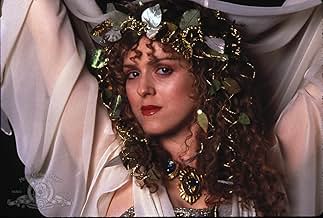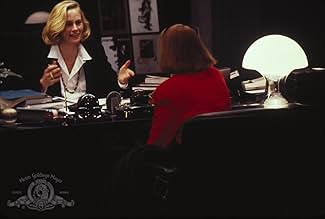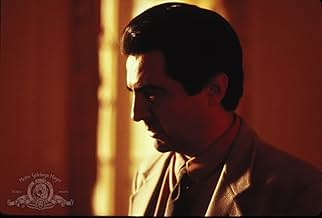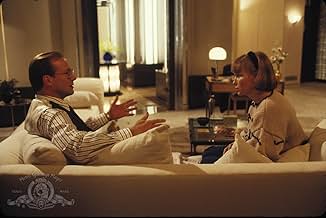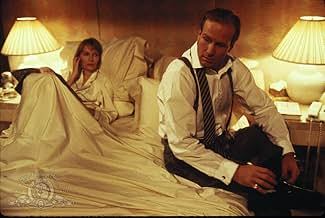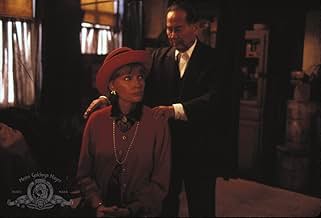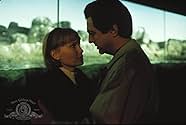IMDb रेटिंग
6.6/10
16 हज़ार
आपकी रेटिंग
मैनहट्टन की एक बिगड़ी हुई हाउसवाईफ, चाइनाटाउन के हीलर से मिल कर आने के बाद, अपनी ज़िंदगी का पुनर्मूल्यांकन करती है.मैनहट्टन की एक बिगड़ी हुई हाउसवाईफ, चाइनाटाउन के हीलर से मिल कर आने के बाद, अपनी ज़िंदगी का पुनर्मूल्यांकन करती है.मैनहट्टन की एक बिगड़ी हुई हाउसवाईफ, चाइनाटाउन के हीलर से मिल कर आने के बाद, अपनी ज़िंदगी का पुनर्मूल्यांकन करती है.
- 1 ऑस्कर के लिए नामांकित
- 1 जीत और कुल 7 नामांकन
Matthew H. Williamson
- Dennis
- (as Matt Williamson)
कहानी
क्या आपको पता है
- ट्रिवियाSean Young filmed a small role, but it was later cut. She had been deleted from Woody Allen's previous film Crimes and Misdemeanors (1989) as well.
- गूफ़When Thelonious Monk's version of "Darn That Dream" appears on the soundtrack, the LP sleeve of "Monk's Dream" is shown, implying that Alice and Joe are listening to it. However, the tune is not featured on that album.
However, implications are not necessarily fact; it might be that Alice and Joe had been listening to several Monk albums and had not been meticulous in returning the discs to the appropriate sleeves.
- साउंडट्रैकLimehouse Blues
Written by Philip Braham & Douglas Furber
Performed by Jackie Gleason
Courtesy of Capitol Records, Inc.
By arrangement with CEMA Special Markets
फीचर्ड रिव्यू
Alice Tate (Mia Farrow) is living in New York City, married to Doug (William Hurt), a man from a wealthy family. They have two kids, a lavish condo and domestic employees. Alice eats caviar, spends her days shopping, getting manicures and pedicures, and so on. However, she's not very happy. She's even been thinking about having an affair. When she finally goes to see an acupuncturist, Dr. Yang (Keye Luke), on several friends' advice because her back is bothering her, he tells her that her problem is in her head, not her back. Through his extremely unorthodox treatments, Alice gradually transforms her life.
Although there is a fair amount of light humor in Alice, and it is relatively upbeat and hopeful, the bulk of this film is much more in the vein of director/writer Woody Allen's more "serious" straightforward dramas, ala Interiors (1978), September (1987) and Another Woman (1988). Interestingly, Allen has a strong fantastical thread running through Alice at the same time, and it references a number of literary classics--both thematically and occasionally in terms of more literal content-resulting in a kinship also with Allen's A Midsummer Night's Sex Comedy (1982).
At its heart, Alice is a film about awakening and then achieving authenticity. It is told with a nod to Charles Dickens' A Christmas Carol (1843) (which is even supported by the appearance of "O Tannenbaum/We Wish You A Merry Christmas" by Liberace on the soundtrack at one point), with slight references also to Lewis Carroll's Alice's Adventures in Wonderland (1865) and other fantasy literature, including J.M. Barrie's Peter Pan (1911).
The catalyst through all of Alice's revelations is Dr. Yang, whose slightly rundown Chinatown office is symbolic of Alice periodically making trips to another world for enlightenment, or making repeated treks to pose questions to a metaphorical Oracle at Delphi. Dr. Yang's treatments are designed to address the various ways in which Alice needs to "open up", the various emotional needs she must come to terms with.
It is interesting to note, especially after Allen's The Curse of the Jade Scorpion (2001), that the initial spark for Alice's transformation is provided by hypnotism, as that device appears for the same ultimate purpose in Curse. This probably has some significance for Allen outside of his life in film, although it is difficult to say whether its because he's undergone hypnotic treatment himself or whether he just sees it as a metaphor for digging beneath public facades which one has fooled oneself into believing, too.
Dr. Yang's treatments either result in encountering some important person or event from Alice's past and/or tapping into some unrealized potential. The encounters are often not with real persons. They can be memories made almost literal, ghosts, or hallucinations. These are the most direct parallel to A Christmas Carol. As in that story, eventually Dr. Yang's treatments lead Alice away from an embrace of materialism for its own sake to an appreciation of more humanist values. Of course, Allen makes it a bit more complex than this, so that the positive transformation also has an impact on personal relationships that could be seen as negative, as well.
Alice is also remarkable for its cinematography, which is usually symbolic of the dramatic scenarios. Sometimes this is very overt, as when Dr. Yang's office transforms into an amusement park midway (the slowly strobing red light was particularly exquisite, with red also symbolizing caution), and often it is subtler, as with the tracking shots of Alice and Vicki (Judy Davis) seen through various glass-like surfaces, or Alice and Joe (Joe Mantegna) through a fence as prison bars, or Alice and Dr. Yang with a wall in between them as the camera pans from one to the other, and so on.
Of course the performances are good--Allen can even get admirable performances out of actors whom I usually do not care for, such as William Hurt. Of course most of the dialogue can easily be imagined as emerging from Allen's mouth instead of whatever character happens to be on screen. And of course the music selection is a fine collection of mostly pre-bop classic jazz. In other words, this is a typical post-Annie Hall (1977) Allen film, so if you like his style, Alice is a safe bet, and if you already know you dislike his style, you're probably not even reading this far.
Although there is a fair amount of light humor in Alice, and it is relatively upbeat and hopeful, the bulk of this film is much more in the vein of director/writer Woody Allen's more "serious" straightforward dramas, ala Interiors (1978), September (1987) and Another Woman (1988). Interestingly, Allen has a strong fantastical thread running through Alice at the same time, and it references a number of literary classics--both thematically and occasionally in terms of more literal content-resulting in a kinship also with Allen's A Midsummer Night's Sex Comedy (1982).
At its heart, Alice is a film about awakening and then achieving authenticity. It is told with a nod to Charles Dickens' A Christmas Carol (1843) (which is even supported by the appearance of "O Tannenbaum/We Wish You A Merry Christmas" by Liberace on the soundtrack at one point), with slight references also to Lewis Carroll's Alice's Adventures in Wonderland (1865) and other fantasy literature, including J.M. Barrie's Peter Pan (1911).
The catalyst through all of Alice's revelations is Dr. Yang, whose slightly rundown Chinatown office is symbolic of Alice periodically making trips to another world for enlightenment, or making repeated treks to pose questions to a metaphorical Oracle at Delphi. Dr. Yang's treatments are designed to address the various ways in which Alice needs to "open up", the various emotional needs she must come to terms with.
It is interesting to note, especially after Allen's The Curse of the Jade Scorpion (2001), that the initial spark for Alice's transformation is provided by hypnotism, as that device appears for the same ultimate purpose in Curse. This probably has some significance for Allen outside of his life in film, although it is difficult to say whether its because he's undergone hypnotic treatment himself or whether he just sees it as a metaphor for digging beneath public facades which one has fooled oneself into believing, too.
Dr. Yang's treatments either result in encountering some important person or event from Alice's past and/or tapping into some unrealized potential. The encounters are often not with real persons. They can be memories made almost literal, ghosts, or hallucinations. These are the most direct parallel to A Christmas Carol. As in that story, eventually Dr. Yang's treatments lead Alice away from an embrace of materialism for its own sake to an appreciation of more humanist values. Of course, Allen makes it a bit more complex than this, so that the positive transformation also has an impact on personal relationships that could be seen as negative, as well.
Alice is also remarkable for its cinematography, which is usually symbolic of the dramatic scenarios. Sometimes this is very overt, as when Dr. Yang's office transforms into an amusement park midway (the slowly strobing red light was particularly exquisite, with red also symbolizing caution), and often it is subtler, as with the tracking shots of Alice and Vicki (Judy Davis) seen through various glass-like surfaces, or Alice and Joe (Joe Mantegna) through a fence as prison bars, or Alice and Dr. Yang with a wall in between them as the camera pans from one to the other, and so on.
Of course the performances are good--Allen can even get admirable performances out of actors whom I usually do not care for, such as William Hurt. Of course most of the dialogue can easily be imagined as emerging from Allen's mouth instead of whatever character happens to be on screen. And of course the music selection is a fine collection of mostly pre-bop classic jazz. In other words, this is a typical post-Annie Hall (1977) Allen film, so if you like his style, Alice is a safe bet, and if you already know you dislike his style, you're probably not even reading this far.
- BrandtSponseller
- 25 अप्रैल 2005
- परमालिंक
टॉप पसंद
रेटिंग देने के लिए साइन-इन करें और वैयक्तिकृत सुझावों के लिए वॉचलिस्ट करें
विवरण
बॉक्स ऑफ़िस
- बजट
- $1,20,00,000(अनुमानित)
- US और कनाडा में सकल
- $73,31,647
- US और कनाडा में पहले सप्ताह में कुल कमाई
- $36,274
- 25 दिस॰ 1990
- दुनिया भर में सकल
- $73,31,647
- चलने की अवधि1 घंटा 46 मिनट
- रंग
- पक्ष अनुपात
- 1.85 : 1
इस पेज में योगदान दें
किसी बदलाव का सुझाव दें या अनुपलब्ध कॉन्टेंट जोड़ें



